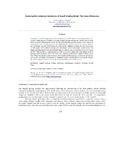Please use this identifier to cite or link to this item:
http://hdl.handle.net/10311/1115| Title: | Exploring the contextual limitations of Angoff grading model: the case of Botswana |
| Authors: | Mogapi, M.O. |
| Keywords: | Angoff Grading System Botswana Performance standards Grading cut-off point |
| Issue Date: | Dec-2012 |
| Publisher: | IJSRE, http://www.ijsre.com/ |
| Citation: | Mogapi, M.O. (2012) Exploring the contextual limitations of Angoff grading model: the case of Botswana, International Journal of Scientific Research in Education, Vol. 5, No. 4, pp. 178-286. |
| Abstract: | Grading is a central component of educational assessment because it is through grading that a student’s performance is judged as having satisfied the requirement for a given unit or grade level. Accurate determination of the cut-off point between adjacent grades is thus critical in ensuring that a letter grade assigned, and ultimately the certificate given, are a true reflection of a candidate’s mastery of the assessed subject matter. Different systems are used to establish cut-off points: each method with its own advantages and disadvantages. In Botswana, the Angoff grading model was adopted following the introduction of criterion referenced testing in 1997. This model was implemented in order to correctly reflect the achievement level of primary school graduates and at the same time, maintain performance standards from year to year. While this model appears to have robust the theoretical foundations, its practical application and success are highly constrained by contextual country-specific factors. This paper outlines the observed practical limitations of the Angoff grading system in Botswana. |
| URI: | http://hdl.handle.net/10311/1115 |
| ISSN: | 1117-3259 |
| Appears in Collections: | Research articles (Dept of Educational Foundations) |
Files in This Item:
| File | Description | Size | Format | |
|---|---|---|---|---|
| Mogapi_IJSRE_2012.pdf | 1.35 MB | Adobe PDF |  View/Open |
Items in DSpace are protected by copyright, with all rights reserved, unless otherwise indicated.
